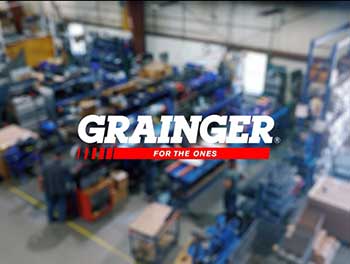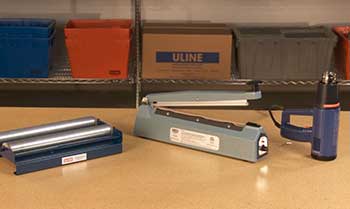When it comes to purchasing industrial supplies and MRO products, Grainger and Uline are two of the biggest names in the business. As major national distributors with extensive product catalogs, they have a lot in common.
But there are also key differences that set them apart. This article examines the pros and cons of Grainger and Uline to help businesses determine which provider is the better fit.
A Brief Comparison Table
| Category | Grainger | Uline |
| Product Selection | Massive, over 1.5 million SKUs | Large but more focused, 50,000+ SKUs |
| Pricing | Higher, not always budget-friendly | Lower, emphasis on discounts |
| Inventory and Availability | Broad network of distribution centers | Large warehouses in key regions |
| Brands | Major national brands and house brands | Primarily own house brands |
| Customer Service | Knowledgeable sales representatives and support | Self-service focused, less personalized service |
| Ordering and Reordering | Robust ecommerce platform | Easy reordering for previous purchases |
| Shipping Speed | Varies based on product availability | Rapid delivery from nearby warehouses |
| Sustainability | More initiatives around sustainability | Limited sustainability programs |
| Retail Locations | Hundreds of branches across North America | No public retail locations, online and by phone only |
Overview Of Grainger And Uline

Grainger and Uline are both distributors of industrial supplies used for maintenance, repair, and operations (MRO). Their product selection includes janitorial items, safety gear, tools, packaging supplies, and more.
Grainger was founded in 1927 and is headquartered in Illinois. It has an extensive network of branches and distribution centers across North America and also ships globally. Grainger claims to carry over 1.5 million products.
Uline was founded in 1980 and is headquartered in Wisconsin. It ships products directly from its warehouses located across the U.S. Uline claims to have over 50,000 products in stock.
Both companies focus primarily on business-to-business sales rather than individual consumers. They offer robust ecommerce platforms as well as sales and customer service support teams. Their goal is to be a one-stop shop for all types of facilities maintenance needs.
Grainger Pros
- Massive product selection: Grainger boasts one of the broadest product catalogs in the industrial supply space with over 1.5 million SKUs available. They carry recognized national brands as well as their own house brands.
- Wide inventory: While not every product is stocked in every warehouse, Grainger’s vast distribution network increases the likelihood they’ll have what you need in stock and readily available.
- Strong customer service: Grainger has earned a reputation for knowledgeable sales representatives and responsive support teams that can answer questions and provide guidance about products.
- Physical locations: With hundreds of branches across North America, Grainger offers greater convenience for purchasing supplies in person. Branches also provide services like tool repair.
- Innovation: Grainger is frequently adding new technologies and solutions to improve the customer experience, such as ecommerce and inventory management tools.
- Sustainability: Grainger has set sustainability goals around reducing emissions, conserving water, and managing waste. The company is making strides around responsible product offerings and operations.
Also Read: Choose Between Uline And Global Industrial.
Grainger Cons
- Higher prices: All that selection and service comes at a cost. Grainger’s prices are consistently higher than competitors, sometimes by a significant margin. Their massive infrastructure also drives overhead expenses.
- Website navigation: The enormity of Grainger’s product catalog can make searching for items on their website a bit tricky. It may require some digging to find exactly what you need.
- Limited budget-friendly options: While Grainger carries name brands across price points, companies on very tight budgets may find the pricing still out of reach on many basic items. The focus is definitely on quality over low cost.
- Sales domain expertise: With so many products available, even experienced Grainger sales reps may not have specialized knowledge about each item to provide nuanced guidance.
Uline Pros

- Low pricing: Uline built their reputation around offering warehouse pricing and aggressive discounts. For cost-conscious companies, Uline is hard to beat on everyday basics like packaging, warehouse, and shipping items.
- Narrow focus: Rather than attempting to be everything for everyone, Uline strategically focuses on core categories relevant to their target customer base. This results in highly targeted search when shopping.
- Brand consistency: Uline emphasizes carrying a consistent depth of inventory across their major product lines. This makes it simpler for repeat customers to find what they need.
- Ease of reordering: Uline’s website functionality and inventory management tools make it very simple to reorder previous purchases. This saves procurement time.
- Easy returns: Uline offers a very liberal return policy – essentially anything can be returned within 60 days. Especially for first time purchases, this alleviates concerns over finding the right product.
- Rapid shipping: Orders ship same or next business day from Uline warehouses located across the country. Speedy shipping makes it easy to get supplies fast.
Uline Cons
- Limited product lines: With a focus on value, Uline does not attempt to offer exhaustive selection like Grainger. Their catalog is still robust but more heavily concentrated in key categories. Businesses with needs outside Uline’s core may find options lacking.
- Minimal service: To keep costs down, Uline does not invest heavily in personalized sales and support teams. If detailed guidance is needed, Uline self-service resources may come up short.
- Unknown brands: Uline relies more on their own house brands rather than major name brands for many products. The quality is typically satisfactory, but buyers sacrifice familiarity and reputation.
- Website navigation challenges: Some customers report difficulties finding specific items efficiently on Uline’s website, an area where search and navigation could be improved.
- Limited sustainability: Uline has fewer initiatives around sustainability compared to a company like Grainger. While they are taking steps in this area, there is room for improvement.
- No retail locations: For customers that value an in-person purchasing or support experience, Uline only operates warehouses and corporate offices rather than public-facing stores.
Also Read: Comparison Between Quill And Staples.
Frequently Asked Questions (FAQ)
Yes, Grainger and Uline are direct competitors in the industrial supply distribution space. They both target business customers with maintenance, repair, and operations (MRO) products servicing facilities.
Uline is considered one of Grainger’s top competitors, along with MSC Industrial Supply and Fastenal. Grainger still maintains the largest overall market share within industrial supply distribution.
Uline lists Grainger as one of their primary competitors, along with Fastenal, MSC Industrial Supply, and McMaster-Carr. These companies all provide similar product offerings focused on facilities maintenance and operations.
Uline is seen as the most direct equivalent to Grainger in terms of full-service industrial distribution. Other Grainger competitors like Fastenal and MSC offer similar but smaller product selection.
Also Read: Comparison Between Wipebooks And Rocketbooks.
The Bottom Line
Grainger and Uline both have their particular strengths in the industrial supply space. Grainger shines when it comes to extensive selection, service, and distribution capabilities. Uline wins on price and efficiency.
For larger corporations with sophisticated supply chain operations already in place, Uline often provides the best value. The self-service model gives procurement power to the buyer.
For smaller businesses or those seeking more guidance, Grainger’s broader resources and expertise make them an excellent fit. The tradeoff for excellent service is higher upfront product cost.
Ultimately, evaluating your business’ specific needs and priorities will determine whether the Grainger or Uline approach resonates more. Both understand the industrial B2B space deeply and provide immense value – it comes down to aligning with the vision and strengths of each.
